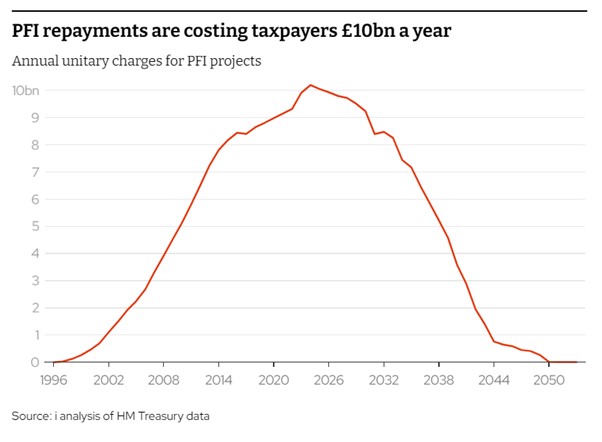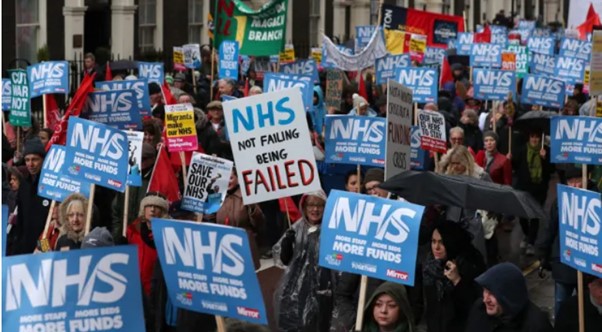By Steve McKenzie (Lewisham, Greenwich and Bexley Unite Community)
At last, after fourteen years of chaos and neglect, the Tories have been kicked out of office. We now have a Labour government with a landslide majority of more than 170, (albeit on only 34 percent of the vote). For campaigners, workers and patients in the health service, this means the next stage of the battle to save and rebuild NHS starts now.
Getting rid of the Tories was only the first essential step. Their drive to privatise the NHS, and force us down the road of private healthcare, has been accompanied by a wilful neglect of the health service as we know it. This has led to a rapid deterioration in levels of care and is responsible for the desperate state our NHS finds itself in today.
It is crystal clear for all to see that the situation is desperate, and patients are simply not receiving the level of care they have every right to expect
The situation has degenerated so badly that there are thousands of unnecessary deaths in the health service every year. It is difficult and bordering on impossible to get a face-to-face appointment to see a GP. Then there are 7.7 million patients waiting in pain and discomfort for operations,
Accident and Emergency departments (A&Es) are packed solid with sick patients waiting hours and hours to see a doctor. Those who need an ambulance face unacceptably long waits, and frequently there are ambulances queuing outside of A&E departments for hours waiting to hand patients over to overstretched staff. Overcrowding and lack of space means that corridor care is a common feature in many hospitals.
Disastrous
The disastrous list goes on and on, while stressed and overworked staff are working flat out to try and maintain a service.
Running down the NHS is a direct consequence of a quite a deliberate strategy by the Tories. Their longer-term objective was to privatize the NHS, which effectively would no longer be free at the point of need, and to introduce a service based on the ability to pay. Currently many NHS services, badged as being provided by the NHS, have already been privatised and are run by private sector companies, operating primarily for profit.
For private healthcare firms, patient need is secondary to profit. These services should be brought back into the NHS at the earliest opportunity and run purely on the basis of need. The entire profit ethos should be driven out of the NHS.
Money wasted
Private healthcare sucks hundreds of millions out of the health service each year in profits. It is estimated that private shareholders have taken £6.7 billion, or £10 million a week, in profits out of the NHS since 2012. That £6.7 billion should have been spent on front line services.
On top of this there are the billions that are paid back, out of the NHS budget, in interest charges to the finance industry and building conglomerates on hospitals that were built under the Private Finance Initiative (PFI) many years ago, often under the New Labour government. Many of these hospitals are now crumbling and are in a state of disrepair. They are in urgent need of updating and maintenance.

The National Audit Office, the spending watchdog, said in a 2018 report that taxpayers would pay £200bn to contractors over the next 25 years. Auditors found the cost of privately financing projects could be as much as 40 per cent higher than relying only on government money. Even the Tories abandoned starting any new PFI schemes, but we are still paying through the nose for the existing ones.
To add to the chaos that privatisation and neglect has brought about, there is also the waste of added layers of administration that goes with the privatisation of services – the monitoring and negotiating between parts of the service in the “internal market”.
It is not an exaggeration to say that the Labour government has inherited a chaotic health service on the verge of collapse. It will take radical policies, investment, redirection of resources and determination to turn the situation around.
Labour boldly claims that it has saved the health service before and will do it again. They say that with Labour the health service will always be publicly run and publicly funded. But significantly and worryingly they do not say publicly provided.
Labour’s timid proposals
However, the timid nature of the proposals in the Labour party election manifesto are at best limited and lacking in ambition. Many fear that this reflects a lack of political will and commitment among the Labour leadership to get to grips with the real issues facing the health service.
Labour’s limited proposals are: –
- To cut waiting times by having 40,000 extra operations performed every week.
- To double the number of cancer scanners
- To implement a new dentistry rescue plan
- To employ 8,500 mental healthcare staff
- To bring about the return of the family doctor
These are all commendable, but in reality, these targets, even if met, would be a drop in the ocean. At worst, some of them are ill thought out and empty promises that will not be implemented.
The proposal of an extra 40,000 operations a week may be a good headliner but if we scratch beneath the surface, even this limited proposal is fraught with problems. Wes Streeting, the new health secretary, plans to use already exhausted and stressed staff to work extra hours at evenings and weekends and to use ‘spare capacity’ in the private healthcare sector, to ensure that this target is met.
Even if any spare capacity does exist in the public or private sector this can be nothing more than a short-term fix, not to mention that even if the extra 40,000 operations are carried out it would still take years to get the waiting list down to an acceptable level.
Real solutions
If Streeting was really serious about addressing the problems that the NHS was facing, he would be looking at the 135,000+ staff vacancies, of doctors, nurses and other healthcare workers that exists. Thousands of burnt-out staff are leaving every month, and this is a core problem that has to be addressed.

Immense pressure needed to stop privatisation
Paying staff properly, ensuring doctors and nurses are not burdened with mountains of debt when they have completed their training, restoring bursaries – all of these kinds of measures will require radical policies, serious commitment, investment and the redirection of resources.
Worryingly Streeting and Starmer are looking to expand private investment in a range of public services. But we need to learn the lesson of the PFI or other schemes where the government encourage private investment by taking on the risk while the companies take the profits.
- Stop the private healthcare providers sucking £10 million out of the health service in profits every week.
- Bring all services back in house and kick private profit-making companies out of the NHS. This is an essential pre requisite and a central key to saving and rebuilding it.
- Prioritise spending money on front line services, instead of filling the pockets of shareholders in the private health industry.
- Cancel the debts on old PFI projects. That would release billions that could be spent on front line services and/or rebuilding some of our crumbling hospitals.
- Bring the expertise, the engineers, the architects, the service delivery people to work for the NHS directly without passing the costs unfairly on to younger and future generations, through unsustainable debt.
Political will lacking
Unfortunately, such radical but necessary policies will not be adopted by the current Labour leadership unless immense pressure is mounted by NHS unions and health service campaigners.
It is incumbent on the health service unions to take a lead and ensure that this pressure is brought to bear on the new Labour government. The Labour party conference is in Liverpool from Sunday 22nd September to Wednesday 25th September. No doubt the leadership will try and turn it into a victory celebration and the world’s mainstream media will be focusing on this event.
If a lobby and demonstration to save and rebuild the NHS was organised by the BMA or the RCN it would receive tremendous support. NHS unions affiliated to the Labour Party, like Unison, the GMB and Unite would come under pressure from their members to support such a move and there is no doubt that patient and NHS support groups would get behind it as well. If campaigned for effectively beforehand, a good section of the population of Liverpool would undoubtedly support such a lobby and demonstration.
Step one – getting rid of the Tories – has been achieved. Effective campaigning to put pressure on the Labour government is now on the order of the day to save the NHS and give us all the security of having a health service that meets our needs.




An excellent article and very good analysis. But the question is for LH, having posited the idea of lobbying the Labour Party conference will you be instrumental in assisting in that endeavour to further highlight public concerns on the NHS, or are you simply offering articles to encourage others ? We know industrial activity without political insight is only partially effective and this is why syndicalism is somewhat dismissed. But will political comment without supportive action be any better received ?
At this point in time, Dave, (unfortunately) Left Horizons simply hasn’t got the level of support in the labour movement to initiate a lobby of Labour Party conference ourselves. Although we put ‘Agitate, Educate, Organise’ on our email Newsletters, it is the first two of these that we accomplish best. At present, our ability to ‘organise’ is eclipsed by the size of far bigger labour movement organisations, especially the trade unions. However, a lobby is something that really ought to be organised by NHS unions, or possibly even an affiliated organisation like the Socialist Health Association. Rest assured, if such a lobby were organised, we would give it as much publicity and support as we can.